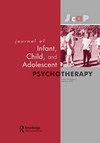Personality Traits, Gender, Parenting Styles and Cyberbullying: A Quantitative Study of In-School Adolescents in Nigeria
Q3 Psychology
Journal of Infant, Child, and Adolescent Psychotherapy
Pub Date : 2023-04-03
DOI:10.1080/15289168.2023.2203600
引用次数: 1
Abstract
ABSTRACT This present study examines the predictive role of personality, gender, and parenting styles on cyberbullying victimization among in-school adolescents. A cross-sectional survey design was utilized in this study. Participants (N = 356) ranged in age from 10 to 17 years (Mean age = 14.77; SD = 2.91) and were selected from four secondary schools in Osun state, Southwestern, Nigeria. Results of correlation analyses showed significant positive relationships between extraversion and cyberbullying victimization r(354) = .53, p < .05 and openness to experience and cyberbullying victimization r(354) = .13, p < .05.Multiple regression analyses revealed that extraversion (β = .24, t = 2.49, 95% CI = [−.079, −.073]) and openness to experience traits (β = .16, t = 2.36, 95% CI = [.181, .201]) independently predicted cyberbullying victimization. Additionally, t-test analyses indicated that there was no gender difference in the level of cyberbullying victimization among in-school adolescents t(354) = −0.61, p = .>.05 95% CI (−.2.11, .14), p > .05.These findings suggest that psychologists should consider the role of personality traits (extraversion and openness to experience) when organizing programs focused on reducing cyberbullying victimization among in-school adolescents.人格特质、性别、父母教养方式与网络欺凌:奈及利亚在校青少年的定量研究
摘要本研究探讨了人格、性别和父母教养方式对在校青少年网络欺凌受害的预测作用。本研究采用横断面调查设计。参与者(N = 356)年龄从10岁到17岁不等(平均年龄= 14.77;SD = 2.91),选取自尼日利亚西南部奥逊州的四所中学。相关分析结果显示,外向性与网络欺凌受害呈显著正相关r(354) =。53, p。95% CI (- 2.11, .14), p > 0.05。这些发现表明,心理学家在组织旨在减少在校青少年网络欺凌受害者的项目时,应该考虑人格特征(外向性和开放性)的作用。
本文章由计算机程序翻译,如有差异,请以英文原文为准。
求助全文
约1分钟内获得全文
求助全文
来源期刊

Journal of Infant, Child, and Adolescent Psychotherapy
Psychology-Clinical Psychology
CiteScore
1.70
自引率
0.00%
发文量
37
 求助内容:
求助内容: 应助结果提醒方式:
应助结果提醒方式:


